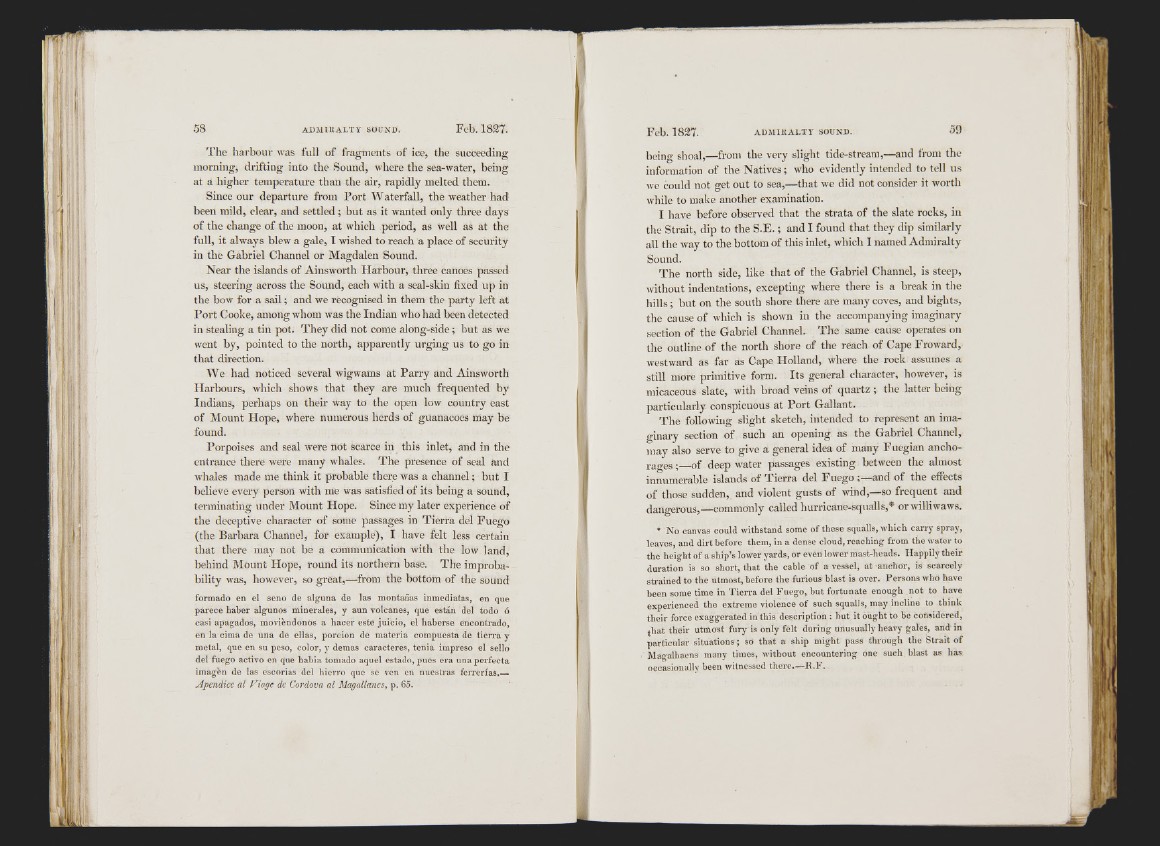
í n : í
li i(' - !
The harbour was full of fragments of ice, the succeeding
morning, drifting into the .Sound, where the sea-water, being
at a higher temperature than the air, rapidly melted them.
Since our departure from Port Waterfall, the weather had
been mild, clear, and settled; but as it wanted only three days
of the change of the moon, at which period, as well as at the
full, it always blew a gale, I wished to reach a place of security
in the Gabriel Channel or Magdalen Sound.
Near the islands of Ainsworth Harbour, three canoes passed
us, steering across the Sound, each with a seal-skin fixed up in
the bow for a sail; and we recognised in them the party left at
Port Cooke, among whom Avas the Indian who had been detected
in stealing a tin pot. They did not come along-side; but as Ave
went by, pointed to the north, apparently urging us to go in
that direction.
W e had noticed several Avigwams a t P a rry and AinsAvorth
Harbours, Avhich shows th a t they are much frequented by
Indians, perhaps on their way to the open low country east
of Mo u n t Hope, where numerous herds o f guanacoes may be
found.
Porpoises and seal Avere not scarce in this inlet, and in the
entrance there Avere many whales. T h e presence o f seal and
Avhales made me think it probable there Avas a ch an n e l; b u t I
believe every person Avith me Avas satisfied of its being a sound,
terminating under Mount Hope. Since m y later experience of
the deceptive character of some passages in T ie rra del Fuego
(the Barbara Channel, for example), I have felt less certain
th a t there may not be a communication Avith the I o a v land,
behind Mount Hope, round its northern base. T h e improbability
was, hoAvever, so g re at,—from the bottom of the sound
formado en el seno de alguna de las montanas inmediatas, en que
parece haber algunos minerales, y aun volcanes, que están del todo ó
casi apagados, moviéndonos a hacer este juicio, el haberse encontrado,
en la cima de una de ellas, porción de materia compuesta de tie rra y
metal, que en su peso, color, y demas caracteres, tenia impreso el sello
del fuego activo en que había tomado aquel estado, pues era una perfecta
imagén de las escorias del hierro que se ven en nuestras ferrerías.-—
Apcndice al Viagt de Cordom al MagallancSy p. 65.
being shoal,—from the very slight tide-stream,—and from the
information of the Natives; Avho evidently intended to tell us
Ave could not get ou t to sea,—th a t Ave did not consider it Avorth
Avhile to make another examination.
I have before observed that the strata of the slate rocks, in
the Strait, dip to the S .F .; and I found that they dip similarly
all the Avay to the bottom of this inlet, Avhich I named Admiralty
Sound.
T h e north side, like th a t o f the Gabriel Channel, is steep,
Avithout indentations, excepting where there is a break in the
h ills ; b u t on the south shore there are many coves, and bights,
the cause of Avhich is shown in the accompanying imaginary
section of the Gabriel Channel. T h e same cause operates on
the outline o f the north shore of the reach of Cape Froward,
AvestAvard as far as Cape Holland, Avhere the rock assumes a
still more primitive form. I ts general character, however, is
micaceous slate, with broad veins of q uartz ; the latter being
p articid a rly conspicuous a t P o rt Gallant.
T h e following slight sketch, intended to represent an imaginary
section of such an opening as the Gabriel Channel,
may also serve to give a general idea of many Fuegian ancho-
i-ages;—of deep water passages existing between the almost
innumerable islands of T ie rra del Fuego ;—and o f the effects
of those sudden, and violent gusts o f Avind,— so frequent and
dangerous,—commonly called hurricane-squalls,* or williwaAvs.
• No canvas could Avithstand some of these squalls, w hich carry spray,
leaves, and d irt before them, in a dense cloud, reaching from the Avater to
the height of a ship’s loAA-er yards, or et-en loAver mast-heads. Happily th e ir
duration is so short, th a t the cable of a vessel, a t anchor, is scarcely
sti-ained to the utmost, before the furious blast is over. Persons Avho have
been some time in T ie rra del Fuego, but fortunate enough n o t to have
experienced the extreme A'iolence of such squalls, may incline to th in k
the ir force exaggerated in this description ; l)ut it ought to be considered,
jh a t the ir utmost fury is only felt during unusually heavy gales, and in
particular situa tions; so th a t a ship might pass through the S trait of
Magalhaens many times, without encountering one such blast as has
occasionallv bum» witnessed th e re .—R .F .
ñ